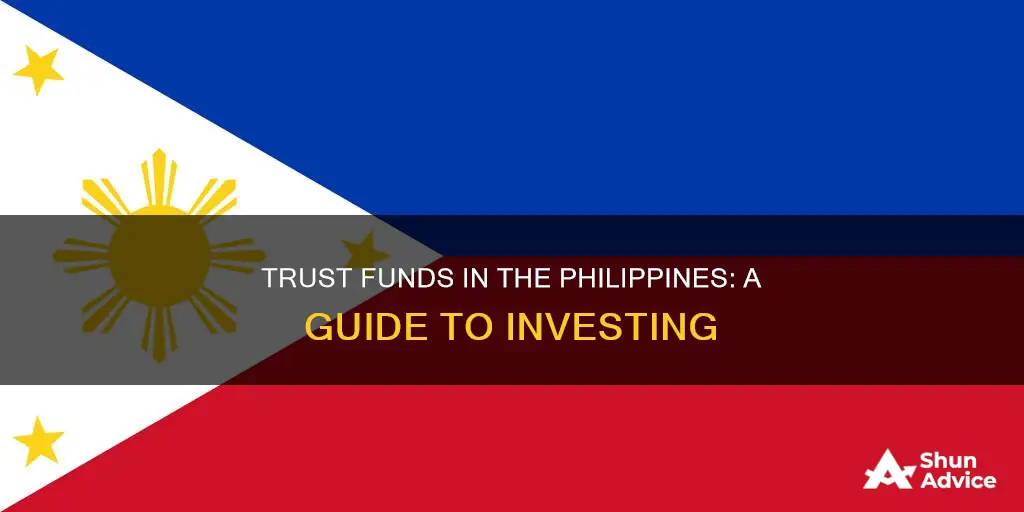
Trust funds are a way to secure your assets and pass them on to your loved ones. They are a legal entity that holds assets and properties for an organisation or a person. While they are often associated with wealth and privilege, trust funds can be useful for anyone who wants to ensure their assets are taken care of and distributed according to their wishes. In the Philippines, trust funds can be set up through banks and financial institutions such as BDO, PNB, and Security Bank. The minimum investment amount varies depending on the institution, but it can start from as little as Php5,000. When setting up a trust fund, it's important to work with a financial advisor to ensure your assets are allocated in the best way possible.
| Characteristics | Values | |
|---|---|---|
| Definition | A trust fund is a legal entity that holds assets and properties for an organization or a person. | |
| What it is not | A trust fund is not the same as drawing up a will since these are different legal ways to handle your assets. | |
| Who is it for | Anyone who wants to pass down their assets to their loved ones. | |
| What it includes | Trust funds are not only limited to money but also businesses, pieces of jewelry, bonds, real estate properties, stocks, or a combination of various assets. | |
| People involved | Grantor (person who transfers assets to a trust fund), trustee (person or entity that holds and manages the assets), beneficiary (person or organization that benefits from the assets). | |
| How it works | The grantor transfers assets to the trustee, who manages and distributes them according to the terms of the trust agreement. | |
| Types of trust funds | Living trust, testamentary trust, blind trust, charitable trust, revocable trust, irrevocable trust, asset protection trust, individual retirement account trust, generation-skipping trust, grantor-retained annuity trust, qualified personal residence trust, qualified terminable interest property trust, special needs trust, etc. | |
| How to open a trust fund in the Philippines | Through banks and financial institutions such as BDO, PNB, Security Bank, etc. | |
| Minimum investment | Most trust fund service providers in the Philippines have a minimum limit of Php100,000. PNB's Personal Trust Fund has a minimum investment of Php1 million or its US dollar equivalent. | |
| Benefits | Professional management, specific purposes (e.g., estate planning, education funding, charitable endeavors), structured way to preserve and distribute wealth, tax benefits, asset protection. | |
| Risks | Price risk, interest rate risk, liquidity risk, credit risk. |
What You'll Learn

Understanding the basics of trust funds
A trust fund is a legal entity that holds assets and properties for an organization or a person. It is a fiduciary relationship where a trustee holds the right to manage the assets of a trustor for a beneficiary or beneficiaries. The trustee must manage these assets according to the terms outlined in the trust agreement.
The trustor is the person who transfers their assets or properties into the trust fund. They are also sometimes referred to as the settlor or grantor. The trustee is the person or institution that the trustor gives legal rights to their assets. The trustee can be a friend, family, a charity, or a trust bank. The beneficiary or beneficiaries are the people the trustor wants to give the assets to.
Trust funds are not limited to holding cash but can also include businesses, jewelry, bonds, real estate properties, stocks, or a combination of various assets.
Trust funds are often used to safeguard assets for future generations, support educational expenses, or contribute to philanthropic causes. They can also be used to create a legal vehicle that will set the terms for how assets will be taken care of, gathered, held, or distributed in the future, whether the grantor is living or deceased.
There are several types of trust funds, including living trusts, charitable trusts, asset protection trusts, and individual retirement account trusts. Each type has its own unique features and benefits, such as tax advantages, flexibility, and protection from legal disputes.
Trust funds offer a range of benefits, such as securing assets, managing their growth over time, and providing a structured way to distribute wealth. They also allow the trustor to retain control over their assets and ensure that their wishes are carried out even after their death.
To open a trust fund in the Philippines, individuals can approach banks and financial institutions such as BDO, PNB, and Security Bank. The minimum investment amount varies depending on the institution, with some requiring a minimum of PHP100,000, while others require PHP1 million or its equivalent in US dollars.
Smart Strategies for Investing in Low-Cost Mutual Funds
You may want to see also

How to choose the right type of trust fund
When choosing a trust fund, it's important to consider your financial goals, risk tolerance, and the amount you want to invest. Here are some factors to help you choose the right type of trust fund:
- Purpose: Trust funds can serve various purposes, such as wealth management, estate planning, charitable endeavours, or ensuring the financial well-being of specific individuals. Consider what you want to achieve with the trust fund.
- Type of assets: Trust funds can hold various assets, including cash, real estate, investments, or other forms of wealth. Decide what types of assets you want to include in your trust fund.
- Beneficiaries: Identify your beneficiaries and their needs. This can include family members, a spouse, friends, or charitable organizations. Choose a trust fund that allows you to designate your beneficiaries and provides a structured way to preserve and distribute wealth according to your intentions.
- Control and flexibility: Decide how much control you want to have over the trust fund. Some trust funds, like revocable trusts, offer more flexibility as you can modify or revoke them during your lifetime. Others, like irrevocable trusts, cannot be altered once established.
- Tax implications: Consider the tax benefits offered by different types of trust funds. For example, certain trusts, such as irrevocable trusts, can help minimize estate taxes.
- Protection of assets: If you want to shield your assets from creditors and legal judgments, consider an Asset Protection Trust (APT). This type of trust is designed to protect your wealth while still allowing you to benefit from certain income streams.
- Investment objectives: Different trust funds have different investment objectives, ranging from conservative to aggressive. Identify your investment goals and choose a trust fund that aligns with your risk tolerance and desired level of diversification.
- Costs and fees: Understand the costs and fees associated with different trust funds, such as management fees, taxes, and qualified expenses. These fees can impact your overall returns, so be sure to consider them when making your decision.
- Professional management: Trust funds offer professional management, where fund managers make strategic investment decisions on your behalf. Consider the expertise and track record of the fund managers when choosing a trust fund.
Maximizing Your HSA: A Guide to Investing Your Funds
You may want to see also

The benefits of using a financial institution to set up a trust fund
Trust funds are a great way to secure your assets and manage their growth over time. They are a legal entity that holds assets and properties for an organisation or a person. Here are some benefits of using a financial institution to set up a trust fund:
Expertise and Experience
Financial institutions have experienced professionals who can provide expert guidance on structuring and managing your trust fund. They can help you navigate the complex legal and financial landscape, ensuring that your trust fund complies with regulations and maximises benefits for you and your beneficiaries.
Investment Opportunities
Financial institutions offer a wide range of investment options and strategies to grow your trust fund. They have the resources and expertise to identify profitable investments that align with your risk tolerance and financial goals. By leveraging their knowledge and networks, they can enhance the performance of your trust fund.
Administrative Support
Setting up and managing a trust fund involves significant administrative tasks, such as record-keeping, reporting, legal compliance, and tax obligations. Financial institutions have dedicated teams to handle these tasks efficiently and accurately, relieving you of the burden and ensuring compliance with regulatory requirements.
Risk Management
Financial institutions employ risk management strategies to protect your trust fund assets. They conduct thorough due diligence, monitor investments, and implement safeguards to minimise potential losses. By utilising their risk management expertise, you can have peace of mind knowing that your assets are protected.
Longevity and Continuity
Financial institutions provide stability and continuity for your trust fund. They have established processes and systems to ensure the smooth management and distribution of assets over the long term. This is especially important if you intend for your trust fund to benefit future generations.
By engaging a financial institution to set up and manage your trust fund, you gain access to their expertise, investment opportunities, administrative support, risk management capabilities, and longevity. These benefits contribute to the effective preservation and growth of your assets, ensuring that your intentions for your beneficiaries are fulfilled.
Mutual Fund Investment Strategies for Your 401(k) Plan
You may want to see also

The tax implications of trust funds in the Philippines
Trust funds in the Philippines can have certain tax benefits, particularly for the grantor. For example, an irrevocable trust, once established, cannot be altered or revoked by the grantor, and is often used for asset protection and minimising estate taxes.
According to the Philippines' Title II, Chapter X – Estates and Trusts, the taxable income of the estate or trust is to be computed in the same manner as that of an individual. The tax is to be paid by the fiduciary, except in the case of revocable trusts and income for the benefit of the grantor.
In the case of income received by the estates of deceased persons during the period of administration or settlement of the estate, and in the case of income which, at the discretion of the fiduciary, may be distributed to the beneficiary or accumulated, there shall be an additional deduction in computing the taxable income of the estate or trust. This is the amount of the income of the estate or trust for its taxable year, which is properly paid or credited during such a year to any legatee, heir or beneficiary.
Trust funds can be a valuable investment option for individuals seeking professional management of their assets in the Philippines. With trust funds, experienced fund managers make strategic investment decisions, often diversifying portfolios to optimise returns while managing risk.
A Step-by-Step Guide to Mutual Fund Investing on Ameritrade
You may want to see also

How to manage and distribute trust funds
Once a trust fund has been set up, the trustee is responsible for managing and distributing the assets to the beneficiaries. The trustee must act in the trust's best interests and follow the state's probate and trust law, as well as the grantor's wishes. The trustee's responsibilities typically include collecting income, disposing of and replacing assets, and making distributions to beneficiaries. They may also need to comply with certain laws and regulations, such as taxes and transfer of legal ownership.
There are several ways to distribute trust assets to beneficiaries, and the grantor determines the method included in the trust agreement. The trust can pay out a lump sum or a percentage of the funds, make incremental payments over time, or make distributions based on the trustee's assessments. The grantor can choose to distribute trust funds on a timed basis or after certain events, such as the beneficiary reaching a certain age or graduating from college.
It is important to note that the trustee has a fiduciary duty to the trust and its beneficiaries. They must comply with the terms of the trust agreement and manage the assets according to the grantor's wishes. If the trustee withholds trust funds or does not comply with the agreement, the beneficiaries can take legal action.
The management of trust assets includes record-keeping, reporting, and ensuring legal and tax compliance. Trustees are usually compensated for their work, although fees may be waived in some cases, such as when the trustee is a family member. The expenses of managing a trust fund include trustee fees, financial and investment advisor fees, attorney fees, accountant fees, property management fees, and broker fees. These expenses increase with the value of the trust fund and the complexity of its terms.
Overall, the management and distribution of trust funds involve following the grantor's wishes, complying with legal and tax requirements, and ensuring that the beneficiaries receive their designated assets in a timely and appropriate manner.
A Simple Guide to Tracker Fund Investment
You may want to see also
Frequently asked questions
A trust fund is a legal entity that holds assets and properties for an organization or a person. Trust funds are not limited to holding monetary assets but can also include businesses, jewelry, bonds, real estate properties, stocks, or a combination of various assets.
A trust fund involves three key parties: the grantor (who transfers their assets to the trust), the trustee (who holds the right to the grantor's assets), and the beneficiary (who the grantor wishes to give the legal rights to their assets). The trustee ensures that the assets in the trust fund are distributed according to the terms outlined by the grantor.
Trust funds offer several advantages. They provide a means of securing assets and managing their growth over time, ensuring that the grantor's assets are well-managed and distributed according to their wishes. Trust funds can also help avoid issues associated with wills, such as the lengthy and expensive probate process.
You can open a trust fund through banks and financial institutions such as BDO, PNB, Security Bank, and RCBC. The minimum investment amount varies depending on the institution, with some requiring a minimum of PHP100,000, while others require PHP1 Million or its equivalent in US Dollars.







